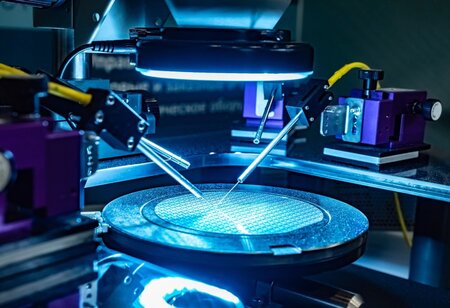China Tiangong Space Station Sets New Standards in Chip Testing
By Consultants Review Team
 China is taking the semiconductor competition to new heights, literally, with its Tiangong space station conducting groundbreaking chip testing. The ambitious initiative involves simultaneously evaluating more than 100 computer processors, successfully testing over 20 cutting-edge chips that surpass the technological capabilities of chips currently deployed in space by other nations, according to a South China Morning Post report.
China is taking the semiconductor competition to new heights, literally, with its Tiangong space station conducting groundbreaking chip testing. The ambitious initiative involves simultaneously evaluating more than 100 computer processors, successfully testing over 20 cutting-edge chips that surpass the technological capabilities of chips currently deployed in space by other nations, according to a South China Morning Post report.
In contrast to NASA's space chips, such as the RAD750 processor in the James Webb Space Telescope, which are based on dated 250-nanometer technology, China's newly tested chips demonstrate advanced sophistication. Designed and manufactured entirely in China, these chips operate on the domestically developed SpaceOS, a common system in China's space endeavors, as reported by SCMP.
The project, led by Liu Hongjin of the China Academy of Space Technology, aims to capitalize on the space station for extensive chip testing—a critical move for China's ambitious space goals. This approach enables discreet testing of numerous new chips for both civilian and military purposes during routine supply missions, with the potential for data transmission back to Earth or physical return for further analysis.
This large-scale orbital testing is poised to significantly advance technology and reduce the research and development costs associated with China's space-grade chips. However, specific details about the chips' manufacturers, designs, and performance parameters remain undisclosed.
China's self-reliant space station offers distinct advantages over the International Space Station (ISS), especially in conducting sensitive chip tests without the constraints of the ISS's stringent information-sharing policies and prohibitions on military-technology experiments.
While NASA recently embarked on developing a faster chip for crucial space missions, China is directing its focus towards competing with private space firms like SpaceX. The challenge lies in balancing the adoption of advanced technologies like artificial intelligence with the vulnerability of densely packed chips to cosmic high-energy particles, known as "single-event upset."
China's strategic approach involves extensive space station testing to foster the development of advanced protection technologies and create a competitive environment for chip suppliers. This strategy is expected to enhance China's production of a new generation of space chips, primarily using mature 28 to 16-nanometer processes, meeting the growing global demand for high-performance, cost-effective space-grade chips.







